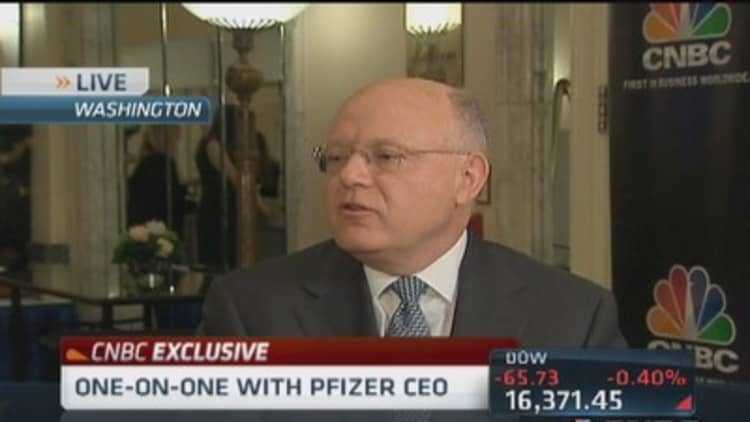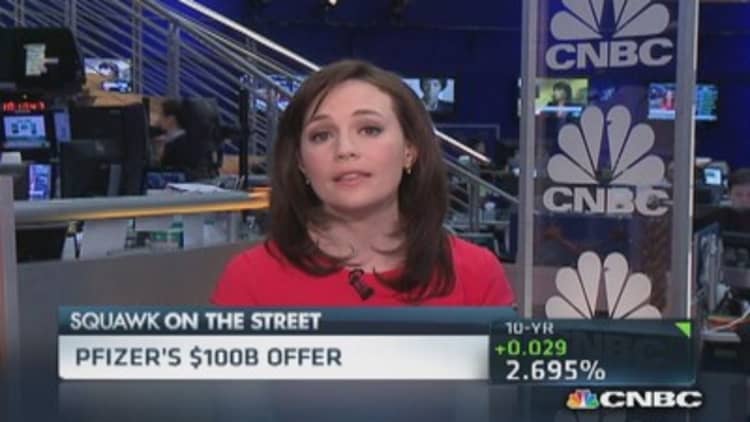Pfizer, the US pharmaceuticals group, has renewed its interest in a takeover of UK rival AstraZeneca, in what would be one of the global drugs industry's largest ever deals.
The US group approached AstraZeneca, which has a market value of £51.5 billion ($86.6 billion), within the last week and could make a public declaration of its interest in a takeover as early as this week, said people familiar with the matter.
Going public would be a move designed to put pressure on AstraZeneca's board to engage in discussions. Pfizer first telegraphed its interest four months ago, when it asked the UK group to consider a takeover. The overture was rebuffed, however, and no formal talks took place.
Read More Pfizer-AstraZeneca deal? Not as crazy as it sounds
The exact value Pfizer is placing on AstraZeneca could not be ascertained, but people familiar with the matter said a bid would be likely to come in at more than $100 billion. This would make it the biggest pharma deal since Pfizer's $111.8 billion takeover of Warner-Lambert in 2000.
People close to the situation cautioned that there was no guarantee of a public declaration by Pfizer.
The move comes at a time of renewed corporate activity in the sector as drugmakers look to deploy large cash piles and cheap debt to strengthen their positions in an increasingly competitive market.

A takeover of AstraZeneca would be easily the biggest foreign acquisition of a British company. UK politicians have raised concern over the implications for jobs and investment since news of Pfizer's earlier tentative interest emerged last week.
AstraZeneca is at the heart of Britain's life-science sector, employing about 7,000 people in the country and accounting for more than 2 percent of exported goods.
Pascal Soriot, AstraZeneca chief executive, last week set out plans for the possible sale or spin-off of non-core assets worth up to $15 billion in an apparent attempt to shore up investor support for his turnround efforts after years of falling sales.
Read MoreAstraZeneca CEO: M&A 'often disruptive'
Shares in the company have climbed a quarter over the past six months amid rising optimism over its strengthening innovation pipeline.
Analysts cite AstraZeneca's growing potential in high-value cancer drugs as one of the main attractions for Pfizer. The US company's desire to find a tax-efficient outlet for tens of billions of dollars in offshore cash is widely seen as another motivation. Pfizer and AstraZeneca declined to comment.
Mergers and acquisitions in the healthcare sector have picked up over the past year. Activity intensified last week when Valeant and the activist investor Bill Ackman teamed up to launch a $45 billion unsolicited bid for Allergan, the maker of Botox, while GlaxoSmithKline and Novartis agreed a $20 billion asset swap. US drugmaker Mylan launched a fresh $9 billion bid for Sweden's Meda and Zimmer agreed to acquire rival medical products maker Biomet for $13.4 billion. Reckitt Benckiser of the UK, meanwhile, is among the contenders to buy the consumer healthcare business being auctioned by Merck for up to $14 billion.
More from the Financial Times:
Siemens intervenes in GE Alstom bid
Philippines seeks US support in China fight
US and China lift climate change hopes
The value of healthcare deals is at more than $150 billion globally for the year to date, according to data from Dealogic. The surge has helped push the overall M&A market above the $1 trillion mark – the first time since 2007 that it has reached that level by this point in the year.

Addressing reporters last week, Mr Soriot refused to discuss the Pfizer speculation but said AstraZeneca remained "extremely committed" to the UK, where it is building a big new research and development center in Cambridge. He also highlighted the risks involved in big mergers.
"Large acquisitions sometimes can work but sometimes they are very disruptive so I think we are better off focusing on what we do well and partnering in other areas," he said.
—By Ed Hammond and Andrew Ward of the Financial Times


